Contents
1. Objectives of performing Shraddha
2. Importance and need of performing Shraddha
3. Benefits of performing Shraddha
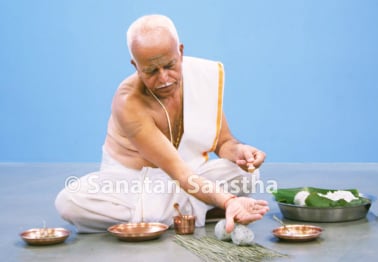
1. Objectives of performing Shraddha
A) Providing momentum to the deceased ancestors present in the Pitru region so that they can progress to a higher sub-plane of existence, through the means of Shraddha.
B) Satisfying wishes and desires of the souls of the deceased ancestors from ones’ family who are trapped in the negative regions due to unfulfilled desires and providing momentum for their further progress.
2. Importance and need of performing Shraddha
A) Repaying the debt to ancestors is as important as repaying the debt to God, Sages and the society. It is the duty of descendants to respect their ancestors, make donations in their name and to undertake activities that will please them. Performing Shraddha is a part of obeying Dharma, as per science of Dharma.
B) Ancestors’ soul becomes satisfied only after receiving pinda and water from their son. In relation to this, following is a verse in the holy text Mahabharat that describes ‘who qualifies to be called as son’ :
पुन्नाम्नो नरकाद्यस्मात्पितरं त्रायते सुत: ।
तस्मात्पुत्र इति प्रोक्त: स्वयमेव स्वयंभुवा ।। – Mahabharat 1.74.39
Meaning : The son protects his ancestors’ souls from the Hell named ‘Puta’. Therefore Lord Brahma himself has named him as ‘Putra’.
As per the above verse, to enable the deceased ancestors to progress to a higher sub-plane, every son should perform ritual of Shraddha. It is amply clear in the verse that the one who is believed to be a son, he should perform these duties.
C) देवपितृकार्याभ्यां न प्रमदितव्यम । – Taittiriya Upanishad 1.11
Meaning : One should not commit mistakes in any task performed towards God or ancestors’ souls. One should not avoid these rituals.
D) Following verse, regarding people who do not perform Shraddha, in the holy text Gita is insightful
पतन्ति पितरो ह्येषां लुप्तपिन्डोदकक्रिया – Shrimadbhagwatgita 1.42
Meaning : Due to the nonperformance of rituals like pinda shraddha and offering water to deceased ancestors etc. the ancestors of such people (who do not perform Shraddha) have to reside in the Hell region. This results in stagnation and no progress of the descendants.
E) श्राद्धात् परतरं नान्यत् श्रेयस्करम् उदाहृतम् । – Sage Sumantu
Meaning : Nothing is as superior as the ritual of Shraddha. Therefore, a person having a pure intellect to discriminate between right and wrong should never abstain from performing Shraddha.
F) Activities related to deceased ancestors are more important than those related to God – Brahmavaivarta Puran. Therefore every sacred ceremony begins with Nandi Shraddha.
G) One who performs the ritual of Shraddha diligently and in accordance with ones financial state, he satisfies everyone right from Deity Brahma to the insignificant blade of grass. No one in the family of the person performing Shraddha remains unhappy. – Brahma Puran
H) At the time of death if a person feels, ‘Shraddha is meaningless and nobody should perform Shraddha for me after my death’ and later because of Shraddha having not been performed, after his death, he experiences that, ‘I am trapped’, then at that time he would not be in a state to convey this feeling to anyone. He could become unhappy because of his wish remaining unfulfilled. Taking this point into consideration, it is absolutely necessary to perform Shraddha for every deceased person.
I) By performing ritual of Shraddha for a deceased person, the give-and-take account that exists with that person gets fulfilled.
3. Benefits of performing Shraddha
A) The ritual of Shraddha is a sacrificial fire performed for deceased ancestors and it is sacred. The benefits derived after performing the ritual of Shraddha are mentioned in Smrutichandrika and other holy texts.
B) If the ritual of Shraddha is performed on the day of an eclipse, the host derives benefit similar to the one obtained after donating a piece of land to someone.


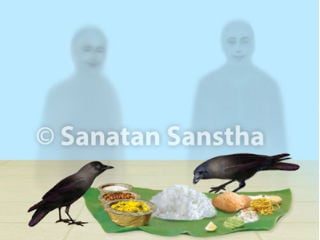 How to perform Mahalaya shraddha in Pitrupaksha during the Coronavirus pandemic ?
How to perform Mahalaya shraddha in Pitrupaksha during the Coronavirus pandemic ?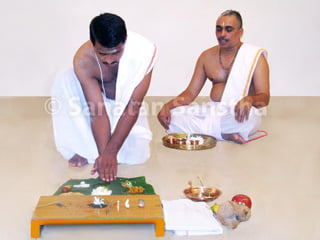 When should the Shraddha be performed ?
When should the Shraddha be performed ?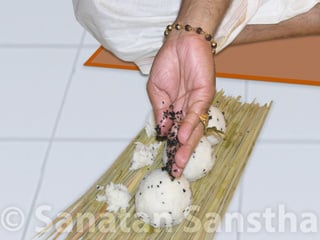 When can women perform Shraddha ?
When can women perform Shraddha ?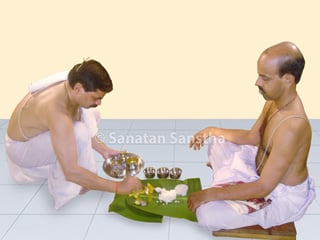 If a person may have been reborn, will performing shraddha in their name help them...
If a person may have been reborn, will performing shraddha in their name help them...
My question: Hindus believe every sole after leaving the body will move in to another body to continue it’s journey of life. That means the sole never die. In that case, is it right to perform shraddha for the sole which never die? Are we not going to perform sharaddha for the living sole?
Namaskar,
Thank you for contacting us. We are glad to see your curiosity regarding Hindu rituals.
Shraddha is a ritual performed to repay the debt towards our departed ancestors. Due to this ritual, the soul of the departed ancestors gain momentum for their upward journey*. It is important to perform the Shraddha ritual for the following reasons –
1. When a person dies with unfulfilled desires, he tends to remain attached to the material world. Hence his upward journey towards the higher regions of heaven stops. Shraddha ritual helps in fulfilling their unfulfilled desires.
2. The souls of departed ancestors receive energy and gain momentum for their upward progress.
3. If the ancestors have taken rebirth on Earth as per Hindu Principles, then also the Energy is received by the Jiva (Soul) and used for the purpose of Spiritual progress.
* – In Hindu Dharma, it is considered that there are 7 higher regions of Heaven and 7 lower regions of Hell (Nether regions).
Regards,
Sanatan Sanstha
If a person has 4 children, will all the sons have to shradha or only elder or youngest son to do? Will the masika to be done by all sons independently?
Namaskar,
Only the son who has done the final rites should do Masik Shraddha, other sons need not perform Masik Shraddha.
Can a son do the shradha Vidhi for Mother or Father, if his wife is pregnant?
Namaskar,
Please perform Brahmarpan. Do not perform Pindadaan. If wife is pregnant, one should not do Pindadaan.
Namaskar,
Do two sons living separately have to individually perform shradh of mother when father heads the family. Please guide.
Namaskar,
A son cannot perform Shraddha if his father is alive.
How many years shraddha should be performed for parents after they passed away? Is it till their son is alive?
Namaskar,
Yes, shraddha should be performed till we are alive and it is performed for past 3 generations (parents, grandparents and great grandparents). Even after one passes away, his/ her son should continue performing it.
Two brothers living seperately can they perform Shraddha seperately..
Namaskar,
Yes, they can perform separately.
Namaskar
If 2 brothers are doing Shradhdha separately earlier can they do now do together
Umaramachandra
Namaskar,
As per Dharmashastra, every son living separately (having different kitchen, source of income and its storage) should perform shraddha separately. Hence, If both sons are contributing (either physically or monetary) and doing then they can do shraddha together.
Namaskar, my question is iam pregnent of 1 month and my father in law expired on april of this year. My husband performed masikam or monthly shraddas till last month. What about upcoming masikams? Can he do remaining masikams or thidi during my pregnency? Plz tell me sir
Namaskar Mrs. Divya Varma ji,
When the wife is pregnant, the husband can perform Shraddha only of his parents with Pinda daan. If he has to perform Shraddha of anyone else, then he should do it without Pinda daan.
Namaskar, my question is iam pregnent of 1 month and my father in law expired on april of this year. My husband performed masikam or monthly shraddas till last month. What about upcoming masikams? Can he do remaining masikams or thidi during my pregnency? Plz tell me sir
Namaskar Mrs. Divya Varma ji,
When the wife is pregnant, the husband can perform Shraddha only of his parents with Pinda daan. If he has to perform Shraddha of anyone else, then he should do it without Pinda daan.
Hello, do I have to perform shradha the place father cremated? Is that Ok if I do this where I live?
Namaskar Neeta ji,
Yes, you can perform shraddha at your home.
Sir,
In case the son is not keen to perform the rituals after death for his mother, what should a daughter do. ? whether doing some charity or annadhanam on the 13th day for personal satisfaction can be done. As per the shastras, only son has the right to perform the rituals and not daughter or son in law .
Namaskar D Srinivasan ji,
In this case if the son is not doing Shraddha then son-in-law can perform Shraddha. But he should seek guidance from the local priest on how to do it.
Namaskaram Sir,
My question is how many Nandi shraadam can be done in one family? The thing is, I have planned Upanayanam for my son in June 2023. And my brother in law(husband’s brother) has planned their son’s Upanayanam in May 2023. Since they are performing ahead of us, they will be doing the Nandi shraadam. Therefore, I want to know as we all belong to one family, doing one Nandi Shraadam is right? Or we both have to do it respectively?
Namaskar,
Please ask the priest (purohit) who would be performing the upanayanam, that you belong to which Gruhyasutra and what rules are prescribed in it for you. Depending on that you will have to take the decision.
Namaskar – Can I do shraaddha and pindadaan of my father in pitru paksha period if my wife is pregnant?
Namaste
You may perform the shraadha but without pindadaan.
Warm regards,
Sanatan Sanstha
Sir, i am doing masikkam for my mother-in-law this year, is there any restriction in doing my father’s shraadha? Should i have to skip it because i am doing my MIL masikkam?
Namaste Venkat ji
You may perform your father’s Shraddha too.
Warm regards,
Sanatan Sanstha